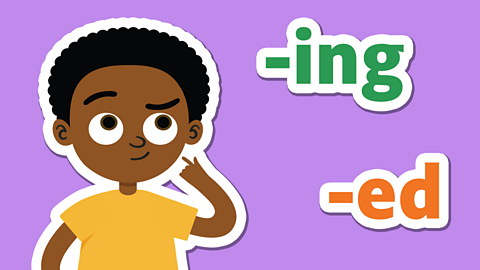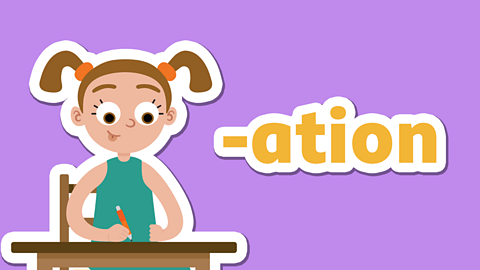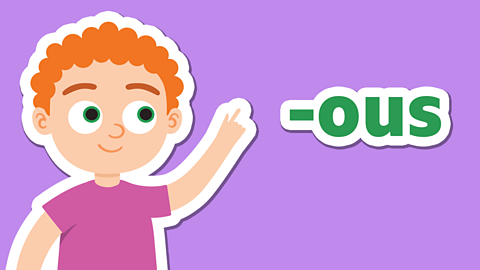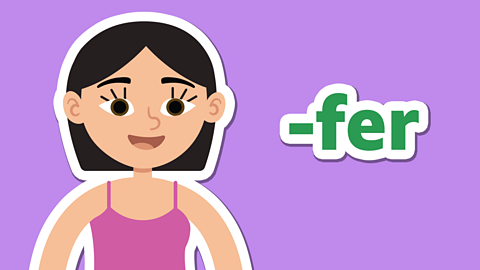Watch: What is a suffix?

A suffix is a letter or group of letters that goes on the end of a word and changes the word's meaning.
Some suffixes have specific uses.
Adding -ing can change a noun into a verb. For example:
garden тЖТ gardening
While adding -ed can put a verb into the past tense. For example:
jump тЖТ jumped

Watch: Suffix spelling rules
Watch this next clip to learn about the spelling rules to follow when using the suffixes -er, -ing, -est, -ed and тАУy.
Learn these four important spelling rules for adding suffixes.
There are four spelling rules to remember when adding '-er', -'ing', '-est', '-ed' and '-y'.
Suffix spelling rules
Rule 1: For words ending in two consonants, just add the suffix to the root word. For example:
smart + er = smarter
Rule 2: For words that end in a short vowel sound followed by a consonant, you need to double the last letter then add the suffix. For example:
mop + ed = mopped
Rule 3: For words ending in a consonant followed by an тАЩeтАЩ, you need to drop the тАШeтАЩ before you add the suffix. For example:
stride + ing = striding
Rule 4: For words that end in a consonant and a тАШyтАЩ, change the тАШyтАЩ to an тАШiтАЩ and then add the suffix. For example:
cry + ed = cried
However if the suffix you want to add starts with an тАШi', you keep the original тАШyтАЩ so that you donтАЩt end up with a double тАШiтАЩ. For example:
cry + ing = crying
Watch out!
These rules are true most of the time but there are always exceptions to spellings in the English language. For example:
ski + ing = skiing.
Top tip
To understand spelling rules, you need to know the difference between vowels and consonants. Vowels are the letters a, e, i, o and u. Consonants are all the other letters.
You also need to know what root words are. Root words are the basic words that are used to form other words. They haven't had prefixes or suffixes added to them yet.
Activity 1
Have a go at this suffixes quiz. Can you get all five questions correct?
Activity 2
Activity 3
Add a suffix to each word in the list, making sure to spell it correctly.
Choose from the suffixes:
- -er
- -ing
- -est
- -ed
Try to use each suffix at least once.
- Laugh
- Short
- Tall
- Hop
- Slip
- Shop
Top tip!
Remember spelling rules 1 and 2.
Rule 1 - For words ending in two consonants, just add the suffix to the root word.
Rule 2 - For words that end in a short vowel sound followed by a consonant, you need to double the last letter then add the suffix.
Activity 4
Add a suffix to each word in the list, making sure to spell it correctly.
Choose from the suffixes:
- -er
- -ing
- -est
- -ed
- Shine
- Joke
- Happy
- Like
- Funny
- Worry
Top tip!
Remember spelling rules 3 and 4.
Rule 3 - For words ending in a consonant followed by an тАЩeтАЩ, you need to drop the тАШeтАЩ before you add the suffix.
Rule 4 - For words that end in a consonant and a тАШyтАЩ, change the тАШyтАЩ to an тАШiтАЩ and then add the suffix. However, if the suffix you want to add starts with an тАШi', keep the original тАШyтАЩ.
Activity 5
For each sentence choose the correct suffix and add it to the word in brackets.
- тАУe▓є│┘
- -er
- тАУe╗х
Write the sentence out with the correct spelling. For example:
John (hurry) to the bathroom = John hurried to the bathroom.
- Jenny (carry) her grandmaтАЩs shopping into the house.
- Ken had the (tidy) desk in the class.
- Anvith knew he would need to try (hard) to beat his best running time.
- Bentley (try) really hard on his spelling test.
- JoanтАЩs cake was much (tasty) than DerekтАЩs.
Top tip!
You will need to replace the 'y' with an 'i' before adding your suffix.
You can check your answers using this
Activity 6
Now you are a super speller, try this activity!
Read each sentence carefully then add a suffix to the word in brackets so that it makes sense in the sentence.
Choose from the suffixes:
- -er
- -ing
- -est
- -ed
Think carefully about the four spelling rules.
I am (plan) to go on a walk at the weekend.
I (walk) for miles yesterday.
Sally was busy (write) in her diary.
Kim (carry) the shopping in from the car.
Number 4 always have the (bright) Christmas lights on the street.
When I am older, I want to be an Olympic (swim).
I got told off for (spy) on my sister.
The new sofa was much (wide) then the last one.
Play our fun English game Crystal Explorers. gamePlay our fun English game Crystal Explorers
Use grammar, punctuation and spelling skills to explore jungles, caves and tombs on your mission!

More on Prefixes and suffixes
Find out more by working through a topic
- count3 of 6

- count4 of 6

- count5 of 6

- count6 of 6
